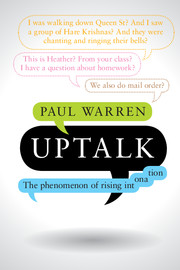Book contents
- Frontmatter
- Dedication
- Contents
- List of figures
- List of tables
- Preface
- Acknowledgements
- List of symbols and abbreviations
- 1 Introduction – why ‘uptalk’?
- 2 The forms of uptalk
- 3 The meanings and functions of uptalk
- 4 Uptalk in English varieties
- 5 Origins and spread of uptalk
- 6 Social and stylistic variation in uptalk use
- 7 Credibility killer and conversational anthrax: uptalk in the media
- 8 Perception studies of uptalk
- 9 Uptalk in other languages
- 10 Methodology in uptalk research
- 11 Summary and prospect
- References
- Index
5 - Origins and spread of uptalk
Published online by Cambridge University Press: 05 December 2015
- Frontmatter
- Dedication
- Contents
- List of figures
- List of tables
- Preface
- Acknowledgements
- List of symbols and abbreviations
- 1 Introduction – why ‘uptalk’?
- 2 The forms of uptalk
- 3 The meanings and functions of uptalk
- 4 Uptalk in English varieties
- 5 Origins and spread of uptalk
- 6 Social and stylistic variation in uptalk use
- 7 Credibility killer and conversational anthrax: uptalk in the media
- 8 Perception studies of uptalk
- 9 Uptalk in other languages
- 10 Methodology in uptalk research
- 11 Summary and prospect
- References
- Index
Summary
The focus in this chapter is on the origins and spread of uptalk. In a recent article in the online BBC News Magazine, Stokel-Walker (2014) commented that ‘the question of how even the UK was infected with this speech pattern has never been adequately answered’. Readers of that article were keen to give their own theories about where uptalk originated, and a follow-up to Stokel-Walker's article lists ten of the most popular opinions expressed by readers (BBC News Magazine, 2014). These mainly consist of suggestions concerning its geographic origins, including two sources that have been quite widely reported both in the research literature and in the media: Australia and California. In addition, other correspondents claimed that the source of uptalk is Celtic varieties (e.g., Northern Irish), or the English spoken in and around Bristol in the west of England, or New Zealand English. We have seen earlier that the rises used in Northern Ireland, i.e., UNB rises, are different in form to uptalk rises. Warren (2014b) suggests that the Bristolian rise is part of a more general sing-song intonation typical of that region (see also Section 4.7.1).
Other comments have linked uptalk to the influence of other languages on English. There are three such influences among the ten opinions selected by the BBC News Magazine: French, Japanese and Norwegian. Chapter 9 considers uptalk in other languages. The suggestion is made there that uptalk in French, particularly Canadian French, has resulted from an influence from English. Researchers (e.g., F. Inoue, 2006) have also commented on the presence of uptalk in Japanese, without being able to determine definitively its provenance. Some maintain that an intonation pattern like this has existed in Japanese for some time, while others believe that is has arisen or at least become more widespread more recently, following closer contact with English. Andersen (2014: 22) notes that while uptalk has been observed in Norwegian dialects since the 1990s, particularly among younger speakers, it is also most likely due to the influence of English.
- Type
- Chapter
- Information
- UptalkThe Phenomenon of Rising Intonation, pp. 97 - 110Publisher: Cambridge University PressPrint publication year: 2016



